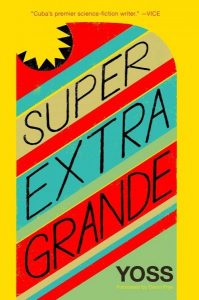by DOREEN THIERAUF
Restless Books, June 2016, 160 pp.
Originally written in Spanish (2012) and masterfully translated into English by David Frye, Super Extra Grande is a genre-bending space opera as original and erudite as its author, a hair metal rocker with a biology degree. The latest work by Cuban sci-fi novelist Yoss, it was a finalist for the 2017 Philip K. Dick award. Its critical success has launched the man behind the pen name, José Miguel Sánchez Gómez, from sidelined minority author into the hall of fame of Northern American science fiction. Running barely over 150 pages, Super Extra Grande is also surprisingly short when considering its rich detail, philosophical depth, and convincing world-building.
At first glance, the novel adheres to the basic features of classic science fiction. The world of Super Extra Grande has faster-than-light travel, futuristic gadgets and spacecraft, an existential threat to the fragile political equilibrium among the galaxy’s intelligent species, and a very special hero chosen to save the day. Yoss does not take any of these tropes all too seriously, however. The novel’s protagonist is the human Dr. Jan Amos Sangan Dongo, famous “Veterinarian to the Giants.” After spending too much of his childhood in low-G environments, Sangan Dongo—the name being a riff on sangandongo, Cuban slang for “really big”—suffers from “González syndrome,” an excessive lengthening of the bones. At almost eight feet, Sangan Dongo is a rather large specimen of homo sapiens and, struggling to fit in, has developed a deep affinity with other oversized organisms. It is therefore only logical that he specializes in the veterinary care of unusually big animals, such as the constipated dinosaurs on the planet Jurassia (successfully cloned by the relatively dim-witted Parimazo, much to humans’ chagrin), the mile-long sea worms, tsunamis, on Nerea, or the largest single-cell organisms in the galaxy, the Laketons of Brobdingnag, measuring more than 250 kilometers in diameter.
The novel opens with Sangan Dongo wading through the intestinal tract of a tranquilized tsunami in search of the priceless platinum wedding bracelet dropped by the third wife of Nerea’s corrupt governor. Aided over radio by his wry reptilian assistant Narbuk (species: Laggoru), who has no sense of humor and is incapable of keeping secrets, Sangan Dongo retrieves the bracelet and embarks on his next adventure. He must save his two former assistants, the human Enti and the Cetian An-Mhaly (both of whom claim to be in love with him), from being digested by a medium-sized Laketon on Brobdingnag. What Sangan Dongo does not know is that the two women, trapped together on a tiny ship, happen to be crucial to the maintenance of peace between the species. The second half of the novel unfurls this interstellar political crisis, interrupted by the narrator’s loquacious and amusing digressions, and mediated by questions of colonialism, diplomacy, technological innovation, and biology. These interconnected themes—along with sly allusions to Cuba’s ongoing campaigns to modernize its infrastructure, clean up a corrupt bureaucracy, and refashion itself into a reliable member of the international community—allow Yoss to imagine a truly revolutionary pan-American cultural identity in which Hispanic and Anglophone heritages intermingle.
The clearest manifestation of this hopeful vision is also one of the most intriguing aspects of the novel. Super Extra Grande contains long passages of dialogue in Spanglish, the galactic lingua franca of the future, and the main language spoken by humans. Sangan Dongo explains that the Intergalactic Coordinating Committee, an organization analogous to the U.N. on Earth, chose Spanglish not because humans are the most noble among all the intelligent species, but because they are cognitively too ill-equipped to acquire alien languages. (Yoss might be poking fun at Westerners’ self-professed inability to acquire Asian or African languages.) The following is a typical exchange between Sangan Dongo and Narbuk:
“Qué eggplant be, Boss Sangan?”
“Es, um, a vegetable, de la Earth. Since you’re un vegetariano, just para contradecir your people, yo creo que you’d like it.” I don’t even know why I said “vayan a fry un eggplant” instead of “vayan a fly un kite,” but thinking about eggplant, sliced thin, sautéed in a sofrito of onion and garlic with tomato, I lick my lips… and only then do I realize: “Wait un segundo, Laggoru, let me adivinar. There’s algo you aren’t telling me. If los ecologistas de Abyssalia already saben I’m going to be tarde, what’s with the llamada urgente? Y más importante, who…”
Narbuk peevishly interrupts me. “Me ahora pass you call, Boss Sangan. Never say be ecologistas. One día you invite a mí a eat eggplant. Prometido?”
Readers without a basic knowledge of Spanish might get lost here, although the context usually aids comprehension. The dialogue anticipates the increasing bilingualism within the United States and models the peaceful integration of Anglophone and Hispanic cultures, and Yoss cannot resist adding some snark. For instance, developed and tested by Ecuador “to the joyous relief of … the entire Spanish-speaking world,” the first faster-than-light satellite unfolds a banner from the Mars orbit that reads “SUCK ON THIS, DUMB-ASS GRINGOS!” (47).
However, for all its fun with bilingualism, the universe of Super Extra Grande is no wide-eyed utopia. As Sangan Dongo notes, the Intergalactic Coordinating Committee continues to struggle with the xenophobia of its member species. Not coincidentally, homo sapiens’ hatred of others is the most virulent in the galaxy. The novel’s central conceit is that the hero’s reverential appreciation of biological diversity and his conservationist politics serve as antidotes to interstellar intolerance. The wealth of imaginative anatomical detail of threatened exo-critters drives home the message that human survival depends on the realization that homo sapiens may coexist and thrive not in spite of, but because of, our geographic and emotional intimacy with beings that look radically different from ourselves. Not only does the novel assume that all life is inherently flawed (and really, really gross), but that biological variability, respectful curiosity, and carefully regulated economic expansion are the foundations of peaceful civilization.
Despite the novel’s profound ethical foundation, Sangan Dongo is an amusing, boisterous, and overly confident character in the mold of Futurama’s Zapp Brannigan or Rick Sánchez of Rick and Morty. The only drawback of the novel, the narrator’s obsession with the sexuality of the all-female Cetians, is directly related to his buffoonery. Only Cetian women attain humanoid maturity and intelligence, while the eel-like males remain in a permanent larva state. In a bizarre inversion of human lactation, Cetian girl-larvae suck the semen of the males to reach maturity (and reproduce later), and they die when their fertilized eggs explode out of their abdomen. However, the absence of a vaginal opening does not lessen a Cetian woman’s sexual use value to human men, Sangan Dongo assures his readers. These purple-skinned, toothless, six-breasted, and always topless creatures give excellent blow jobs, as he repeatedly reports. These at times jarring instances of machismo and sexist humor appear to sacrifice progressive gender politics to convince the traditionally male readership of science fiction of the novel’s radical anti-colonial and anti-homophobic underpinnings. For all its passionate embrace of progressive ecocritical, post-imperial, and LGBT agendas, Super Extra Grande’s reactionary treatment of fundamental gender relations is the one serious flaw that shrinks this otherwise marvelous work down to size.



